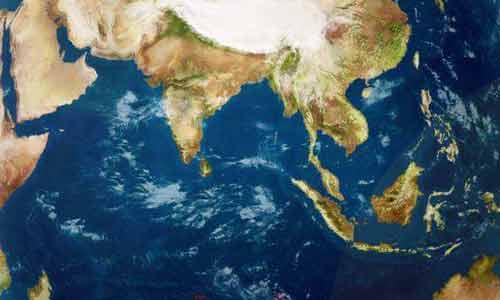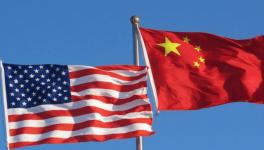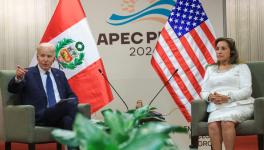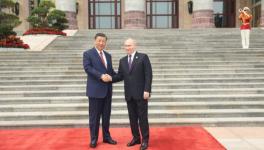Foreign Policy: Between Folly and Foibles

Notwithstanding high praise showered on Prime Minister Narendra Modi by observers and sycophants for “energizing” diplomacy, a close scrutiny reveals that an energetic motion in itself does not mean forward movement. It could mean just the opposite. We need to go no further than our immediate neighbour-hood to witness how one after another the BJP government jeopardized relations with Nepal, Sri Lanka, Maldives, and in Bangladesh hitched India’s fate with the ruling Awami League, rather than remaining equidistance from major contenders or playing favourites.
In Afghanistan, India remains wedded to US military presence and war against Taliban, even when it is evident to all that Taliban have expanded their presence and the even US is willing to hold talks with them. India’s placing all egg in one basket approach has come full circle; starting with backing the northern alliance along with Iran and Russia to now the lone votary of unstinted support for Kabul regime.
As for Pakistan, it is by now clear that bluff and bluster has not broken Pakistan’s resolve and the hyper antics over a make-believe “surgical strike”, has run out of steam. India is back to projecting Pakistan inspired proxy war in Kashmir, in defiance of the ground reality. How else can 300 militants keep 600,000 armed personnel busy, if not for popular support? Although what it does, ironically, is making Pakistan a legitimate player in Kashmir while de-legitimizing the people of Kashmir from any role or agency.
In keeping with this self-inflicted myopia is the 2+2 meeting between US Secretary of State and Secretary Defense with their India counterparts, scheduled now for September 2018, after it had been postponed twice before because other pressing matter occupied US attention. The likelihood of India now signing Communication Compatibility & Security Agreement (COMCASA) makes it evident that pivot of India’s foreign and security policy is India forging a military alliance with wagon US.
A mark of India’s mediocre strategic thinking is available from a recent joint study done by four ‘Think Tanks’ for the members of Quadrilateral alliance-in-making between Australia, Japan, India and US. The group of four think tanks include Sasakawa Peace Foundation (Japan), Vivekananda India Foundation, which was set up by RSS, Australia National University, and Sasakawa Peace Foundation (USA).
Giving at least 20 policy recommendations for the Quad countries, their key plea was to work with partner countries to oppose the establishment of a permanent Chinese military base in the Indian Ocean Region. They also proposed to have independent security and economic policies.
The study was official. Vivekanand India Foundation whose fortunes rose when BJP government came to power was selected over the Ministry of Defense funded Institute for Defence Studies and Analyses (IDSA). And since RSS played no part in India’s Freedom Movement and remained loyal to British Raj and espoused close ties with US post-1947 it would be too much to expect that RSS think tank would champion India’s independent foreign policy and strategic autonomy. Those who never fought for freedom will not know the value of freedom. Therefore, while espousing the call for preventing China from acquiring military bases in the Indian Ocean Region, these so-called ‘Think Tanks’ ignore the role of the US and even Japan.
The US has more than ninety per cent of all military bases or more than 800 bases in eighty countries in the world. True the number of US bases declined from 1600 in 1991 hosting 300,000 soldiers to 800 bases in 80 countries with a deployment of 250,000 soldiers. There are also 60 drone bases which the US possess stretching from Sicily to Guam. In the Indian Ocean region itself, US base at Diego Garcia which houses 10,000 personnel was long opposed by littoral states, including India. A former CIA consultant once wrote that US “garrisons encircle the planet” and that the “US dominates the world through its military power.”
Compared to these 800, Russia has 26-40 bases, UK, France & Turkey have up to ten bases whereas China, India, Japan, South Korea, Germany, Italy and the Netherlands have between 1 to 3 bases each. China does say that it is building 30 major ports from the Strait of Malacca across the Indian Ocean, around Africa and Europe’s extended coastline. There is a possibility that these are dual use ports. Besides, why should China be prevented from acquiring bases to protect the transport and communication network and the sea lanes as a rising power when everyone else possesses their own bases? Also, this is geared against US attempt to throttle and restrain China. In other words to work to prevent China from acquiring bases can only stem from the hostile antagonistic attitude towards China when the US, the world’s biggest warmonger boasts 800 bases worldwide with a record of unparalleled brutality. Besides the US spends at $ 717 bn on the military which is more than twice the amount China, Russia, India, UK, France, Germany, Japan, South Korea, Israel and Saudi Arabia together spend. The US spends $156 bn on its 800 bases alone.
The mediocrity of Indian strategic scholarship reveals itself when it harps about Chinese base in Djibouti, where both US and Japan have bases and India is desirous of acquiring one there too! Not one word is uttered on other bases. So why is China to be prevented from Indian Ocean Region but not the US, UK and France, Japan? If the argument was to make Indian Ocean Region a zone of peace as was once espoused by Sri Lanka it would be one thing. But to peddle a line that everyone but China should have bases in IOR is the mark of feeble intellect.
Advocates from US-funded or pro-US Think Tanks operating from India have tended to be, therefore, purveyors of half-truths. For instance, China’s stance over South China Sea is not de-linked from US’s muscular diplomacy. In August 2010 US declared “national interest” in the South China Sea and conducted naval exercises to reinforce its claim. In retaliation in four years China escalated its territorial claims by building a naval submarine base in Hainan Island, accelerated dredging of seven atolls for military bases in Spratly Islands. And in 2016 rejected the International Court of Justice ruling against it. This does not exonerate China from earning opprobrium overriding rough shod over its smaller neighbours. But US is no paragon of virtue. Both are guided by their own interests. Difference being that China is in ascendance and US in decline and capable of doing much damage.
Lets consider the exemption delivered by US to India from sanctions for purchase of surface to air missiles from Russia and Oil from Iran. In ties with US there are no free lunches. What price will be extracted by the US will become clear from 2+2 meeting in September where Communication Compatibility & Secrecy Agreement or COMCASA is on the table. Were they to sign COMCASA India’s freedom of maneuver would be greatly constrained. Not to mention that this would definitely impact relations with China and Russia, where the Indian PM had to engage in informal summit to repair damaged ties.
Meanwhile, despite exemption US sanctions are already hitting India hard. For two years a consortium led by ONGC was negotiating for two years for development rights for Farzad B Gas Field it discovered a decade back. Just the fear of US sanctions saw ONGC at governments behest mothball this. And India is reducing oil imports from Iran which offered lucrative terms including free shipping, extended credit of 60 days. With weak Indian rupee cost of imports will also hurt Indian consumers.
Two way trade between US and China of $650 bn is seven times larger than India’s $90 bn trade turnover with China, India’s largest trading partner. India’s own export share to China is a miserly $13.3 bn. India’s Ministry of Commerce believes that it is possible to step in and tap an estimated $130 bn of goods which US exports to China now as US exports decline, where India could access the Chinese market.
The point is if the BJP led government wants to put at risk its relations with China by forging a military alliance with US directed against China, and working to prevent China from acquiring bases, then India’s access to Chinese market will become a distant dream.
Does this mean that India should lower guard against China? That would be foolish. But China is our neighbour and with a neighbour, even one with which we have unresolved issues and territorial dispute, differences should not be allowed to descend into conflict. For an outside power like US to dictate who become India’s friends or enemies or to contribute to the US led military build-up against China would be a colossal folly. It is better to stay away from getting entangled in imperial ambitions and military designs of US and its cronies who have their own agenda & will not think twice to abandon India when push comes to shove. We are better off being coveted by all without titling towards any one power block.
Instead the country is being nudged in the direction of compromising its sovereignty by becoming a junior ally of US and going all out to pander to US interests in the name of ‘transactional’ relations. Some even advocate India giving up its independent foreign policy and strategic autonomy by claiming its passe’. Seen in this light what we needed is an energetic diplomacy which allows India to peacefully get on with the task of raising the overwhelming majority of Indians from their wretched conditions of life and labour, instead of getting entangled in conflicts of outsiders making.
Get the latest reports & analysis with people's perspective on Protests, movements & deep analytical videos, discussions of the current affairs in your Telegram app. Subscribe to NewsClick's Telegram channel & get Real-Time updates on stories, as they get published on our website.























